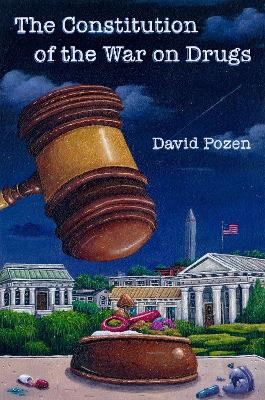
The Constitution of the War on Drugs
Oxford University Press Inc (Verlag)
978-0-19-768545-7 (ISBN)
- Lieferbar (Termin unbekannt)
- Portofrei ab CHF 40
- Auch auf Rechnung
- Artikel merken
An authoritative and first-of-its-kind critical constitutional history of the war on drugs that shows how drug prohibition was shaped by constitutional law, and how constitutional law was shaped by drug prohibition.
The U.S. government's decades-long "war on drugs" is increasingly recognized as a moral travesty as well as a policy failure. The criminalization of substances such as marijuana and magic mushrooms offends core tenets of liberalism, from the right to self-rule to protection of privacy to freedom of religion. It contributes to mass incarceration and racial subordination. And it costs billions of dollars per year--all without advancing public health. Yet, in hundreds upon hundreds of cases, courts have allowed the war to proceed virtually unchecked. How could a set of policies so draconian, destructive, and discriminatory escape constitutional curtailment?
In The Constitution of the War on Drugs, David Pozen provides an authoritative, critical constitutional history of the drug war, casting new light on both drug prohibition and U.S. constitutional development. Throughout the 1960s and 1970s, advocates argued that criminal drug bans violate the Constitution's guarantees of due process, equal protection, federalism, free speech, free exercise of religion, and humane punishment. Many scholars and jurists agreed. Pozen demonstrates the plausibility of a constitutional path not taken, one that would have led to a more compassionate approach to drug control.
Rather than restrain the drug war, the Constitution helped to legitimate and entrench it. Pozen shows how a profoundly illiberal and paternalistic policy regime was assimilated into, and came to shape, an ostensibly liberal and pluralistic constitutional order. Placing the U.S. jurisprudence in comparative context, The Constitution of the War on Drugs offers a comprehensive review of drug-rights decisions along with a roadmap to constitutional reform options available today.
David Pozen is the Charles Keller Beekman Professor of Law at Columbia Law School. He teaches and writes about constitutional law, information law, and nonprofit law, among other topics. Pozen previously served as special assistant to Senator Ted Kennedy on the U.S. Senate Judiciary Committee, special advisor to Legal Adviser Harold Hongju Koh at the U.S. Department of State, and law clerk to Justice John Paul Stevens on the U.S. Supreme Court and Judge Merrick Garland on the U.S. Court of Appeals for the D.C. Circuit. In 2019, the American Law Institute named Pozen the recipient of its Early Career Scholars Medal.
Introduction
Chapter 1: Liberty, Privacy, and the Pursuit of Happiness
Chapter 2: Federalism and Rational Regulation
Chapter 3: Racial Equality
Chapter 4: Humane and Proportionate Punishment
Chapter 5: Freedom of Speech and Religion
Chapter 6: The Conditions of Constitutional Complicity
Chapter 7: New Directions for Constitutional Reform
Acknowledgments
Notes
Index
| Erscheinungsdatum | 25.04.2024 |
|---|---|
| Reihe/Serie | Inalienable Rights |
| Verlagsort | New York |
| Sprache | englisch |
| Maße | 149 x 212 mm |
| Gewicht | 481 g |
| Themenwelt | Geschichte ► Teilgebiete der Geschichte ► Militärgeschichte |
| Recht / Steuern ► Allgemeines / Lexika | |
| Recht / Steuern ► EU / Internationales Recht | |
| Recht / Steuern ► Öffentliches Recht | |
| Recht / Steuern ► Rechtsgeschichte | |
| Sozialwissenschaften ► Politik / Verwaltung | |
| Sozialwissenschaften ► Soziologie | |
| ISBN-10 | 0-19-768545-5 / 0197685455 |
| ISBN-13 | 978-0-19-768545-7 / 9780197685457 |
| Zustand | Neuware |
| Informationen gemäß Produktsicherheitsverordnung (GPSR) | |
| Haben Sie eine Frage zum Produkt? |
aus dem Bereich


